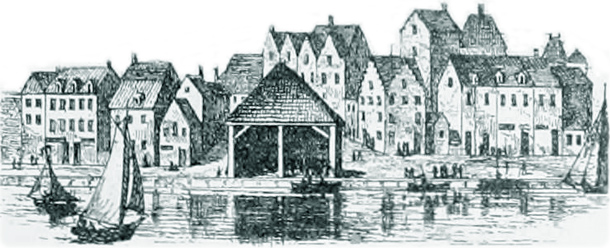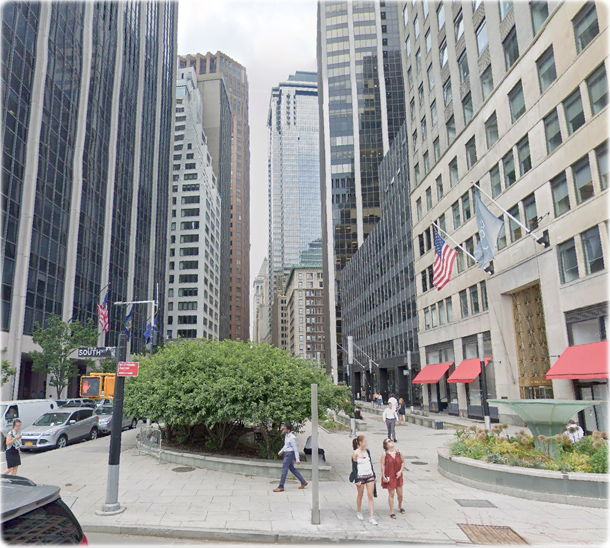
Foot of Wall Street
Since the early years of the Dutch settlement, in the 17th century, the east side of Lower Manhattan, with its proximity to Long Island, was seen as more suitable for trade. The first known wharf was on the line of Moore Street, running out from Pearl Street.
A City Wall to protect the city was constructed in 1653, which set the path for the Wall Street, originally called Het Cingel by the Dutch. By 1660, a half-moon was erected before the Water Gate, on the East River waterfront (present Wall St., west of Water St.). This fortification was demolished by 1688. The City Wall was removed in the late 1690s, allowing the city to grow northwards, and East River waterfront of Wall Street became a prosperous commercial area.
In the early 18th century this section was known as Wall Street Slip. In 1709, a slave market was erected on the site of the old block-house at the fortified city gate. This slave market was in operation until 1762. This structure was renamed the Meal Market in 1826, which also served as ferry house. This structure was removed before the end of 18th century and the Wall Street Ferry was built on the place in 1853.
In the early 19th century, this area was known as Coffee House Slip, because since the 18th century coffee houses flourished here. The Tontine Coffee House, northwest corner of Water Street, was established in 1793. The changing of the Tontine coffee house into an office building, in 1834, marked the end of the coffee-house era in New York. Today, the site is occupied by the Wall Street Hotel, former Tontine Building.
In the first half of 19th century, the Phoenix Building, on the southeast corner of Water St., housed the Phoenix Coffee House.
The Foot of Wall Street, looking east towards East River from Water Street in 1829. Phoenix Building is on the right (NYPL).
The slave market on the Foot of Wall Street in the 18th century. The structure also served as meat market and ferry house. Engraving published in William Burnet, governor of New-York, 1720-1728; a sketch of his administration in New-York by William Nelson, 1892.
Fragment of the Southeast Prospect of the City of New York, 1756-1761.

City Hall
|
Copyright © Geographic Guide - Images of NYC, Historic Places. |
New Dutch Church
The Foot of Wall Street in June 2018, from South Street (Google Street View).
French Church
Trinity Church
Foot of Wall Street
The East River waterfront of Wall Street in 1798, seen the spires of the old temple of Trinity Church (the tallest) and the old temple of the First Presbyterian Church.
